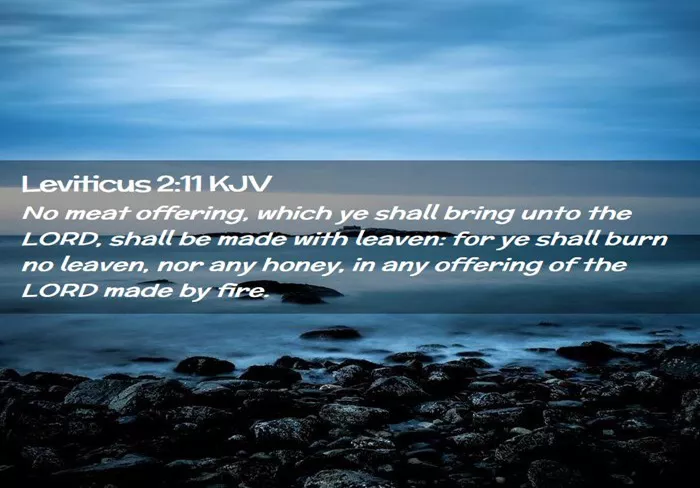Read the Daily Bible Verse – Leviticus 2:11 To Strengthen Your Spiritual Journey.
Leviticus 2:11 in the King James Version (KJV) states:
“No meat offering, which ye shall bring unto the LORD, shall be made with leaven: for ye shall burn no leaven, nor any honey, in any offering of the LORD made by fire.”
This verse, nestled within the laws of offerings presented in Leviticus, outlines specific instructions concerning the use of leaven and honey in grain offerings. For contemporary readers, this verse carries rich symbolic meaning and practical applications. This article explores the context, meaning, and modern-day relevance of Leviticus 2:11, along with its connection to other Biblical texts.
The Context of Leviticus 2:11 KJV
Leviticus is the third book of the Bible, part of the Pentateuch authored by Moses. It primarily addresses the Levitical priesthood and the nation of Israel, providing guidelines for worship, offerings, and maintaining holiness before God.
Understanding the Grain Offering
Leviticus 2 focuses on the grain offering, one of the five major offerings in Israelite worship. Unlike burnt offerings (which involved animals), grain offerings consisted of fine flour, oil, and frankincense. These were typically presented as an expression of thanksgiving and devotion.
Leviticus 2:11 establishes a prohibition against including leaven or honey in these offerings. This rule served both practical and symbolic purposes, reflecting the purity and exclusivity of worship acceptable to God.
The Leviticus 2:11 Meaning
Prohibition of Leaven
Leaven (commonly yeast) was associated with fermentation, a process often viewed in the Bible as a symbol of sin or corruption. In the Jewish Passover, for example, leaven was removed from homes to commemorate Israel’s hasty departure from Egypt and to symbolize purity (Exodus 12:15). In Leviticus 2:11, the exclusion of leaven underscores the call to purity in offerings to God.
Exclusion of Honey
Honey, while sweet and desirable, was also excluded from offerings made by fire. Some scholars suggest that honey’s tendency to ferment made it unsuitable for the altar. Symbolically, its exclusion may highlight the distinction between human desires and divine requirements. Worship, according to God’s design, emphasizes obedience over sweetness or pleasure.
Leviticus 2:11 Application in Life
The principles behind this verse remain profoundly relevant today. While Christians no longer follow Old Testament sacrificial systems, the attitudes and heart postures demanded by these laws transcend time.
Living Pure Lives
The prohibition of leaven calls believers to live holy and unblemished lives. Jesus and Paul both used leaven metaphorically to describe sin’s corrupting influence (Matthew 16:6; 1 Corinthians 5:6-8). Modern Christians can reflect on their need to remove “leaven” from their hearts—sins that can permeate and corrupt their relationship with God.
Worship with Integrity
Honey’s exclusion reminds believers that worship should not be based on personal preferences or external sweetness but rooted in truth and obedience to God’s word. True worship involves submission to God’s will, not indulgence in what feels good or seems convenient.
Comparison with Other Biblical Texts
Old Testament Parallels
Leviticus 2:11 aligns with other Old Testament passages emphasizing purity in worship. Exodus 12:15 speaks of removing leaven during Passover, symbolizing Israel’s readiness and consecration. Similarly, Malachi 1:7-8 condemns polluted offerings, underscoring that God deserves the best, not what is convenient or corrupted.
New Testament Connections
In the New Testament, Jesus frequently warned about the “leaven of the Pharisees and Sadducees” (Matthew 16:6). This metaphor illustrated the dangers of hypocrisy and false teachings. Paul expands on this idea in 1 Corinthians 5:6-8, urging Christians to celebrate their faith with sincerity and truth, free from the “old leaven” of malice and wickedness.
These connections reveal a consistent Biblical theme: God desires pure worship and hearts free from corruption.
Modern-Day Relevance
Personal Purity
Leviticus 2:11 challenges modern readers to examine their personal lives for areas of compromise. Just as leaven spreads through dough, unchecked sin can infiltrate and dominate our lives. Regular self-reflection and confession help believers maintain spiritual integrity.
Authentic Worship
In today’s culture, where worship styles and preferences vary widely, the exclusion of leaven and honey serves as a reminder to prioritize substance over style. Worship should glorify God rather than cater to human tastes or trends.
Corporate Holiness
The communal aspect of Israel’s grain offerings also applies to the Church. The body of Christ is called to be a holy community, encouraging one another in purity and devotion. As Paul writes in Ephesians 5:27, the Church should strive to be “without spot or wrinkle.”
Conclusion
Leviticus 2:11 may seem like an obscure Old Testament regulation, but it holds profound theological and practical insights. Its instructions about leaven and honey reveal God’s desire for purity, obedience, and integrity in worship. By studying this verse in context, comparing it to other scriptures, and applying its principles, Christians can better align their lives with God’s holy standards.
Leviticus 2:11 Commentary
Theologians have long noted the deep symbolism in Leviticus 2:11. Matthew Henry, for instance, emphasizes that the prohibition of leaven and honey reflects the need for sincerity and truth in worship. He argues that these elements, often associated with human indulgence, are incompatible with the divine nature of offerings.
Similarly, other commentaries highlight the forward-looking nature of such laws, pointing to Christ as the ultimate fulfillment of purity and sacrifice. In Him, believers find the true Bread of Life, untainted by sin or corruption.
You Might Be Interested In:


